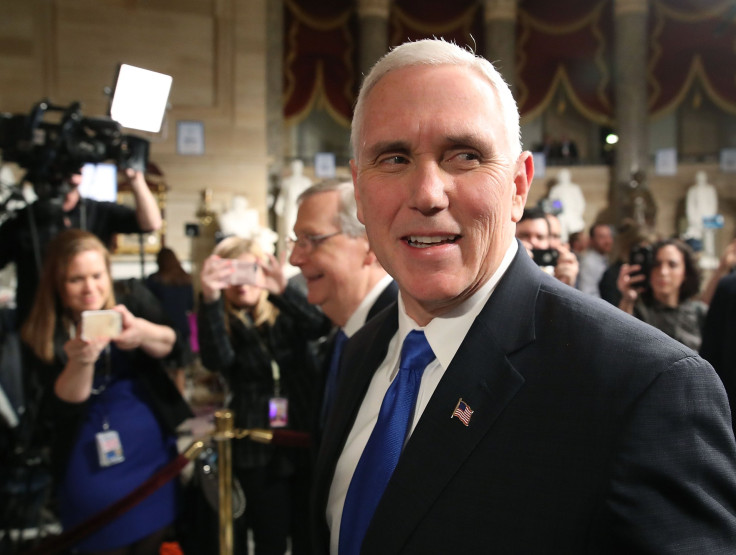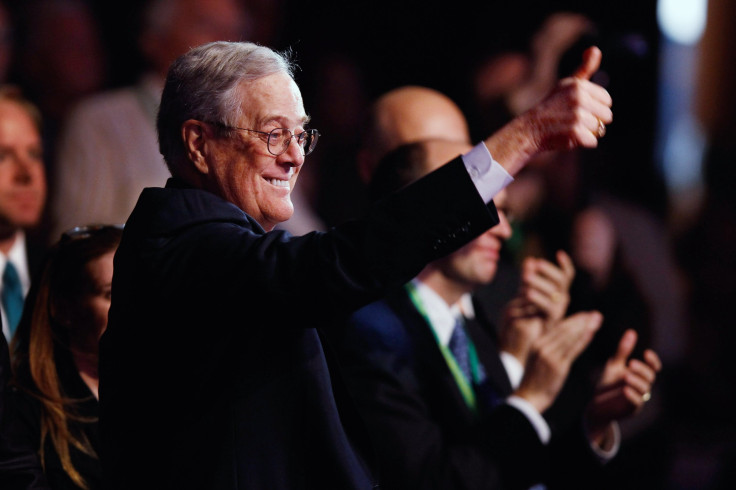The Koch Brothers Want A Tax Cut. Pence Is Ready To Help

In New York City last week, Vice President Mike Pence asked billionaire David Koch and around 100 other wealthy, conservative political donors for help in supporting a Republican tax plan. Since the plan would overwhelmingly benefit the richest Americans — like those he was addressing — Pence probably didn’t need to do much persuading.
“To get this tax cut across the line, to give the American people the tax relief that they need, we need every ounce of your energy and enthusiasm,” Pence told the Republican mega-donors who make up part of the powerful, right-wing political donor network headed by David Koch and his brother Charles, who together run a giant industrial conglomerate and are worth a combined $96.8 billion, according to Forbes. The Koch brothers, whose political operation rivals either of the two major parties, are libertarians and fiercely oppose taxation and government regulation.
One of the Kochs’ primary political advocacy groups, Americans for Prosperity, has already spent millions on a campaign urging GOP lawmakers to pass sweeping tax cuts. The group has, since this summer, planned events in 36 states, launched ads targeting Democratic incumbents in swing states, dispersed activists door-to-door and had its donors call Republican legislators.
As a private company — the second-largest in the U.S. — Koch Industries is not required to report its financial information in the states, but it likely pays a large amount in federal taxes simply because of the size of the corporation: It boasts over $100 billion in revenue per year. However, a 2016 study by a liberal super PAC claimed that Koch Industries own 610 subsidiaries located in 17 global tax havens. And an International Consortium of Investigative Journalists investigation in late 2014 claimed that Koch Industries created a complex tax scheme in Luxembourg that may have significantly decreased its U.S. taxes.
The Koch machine already helped kill a proposed border adjustment tax, which would have taxed companies’ domestic sales and imports. Despite this victory, the Kochs want further tax cuts. President Donald Trump’s tax proposal would move the corporate tax rate down to 20 percent, although this move may not affect a company like Koch Industries, which may already pay a lower effective rate. The plan would reduce the estate tax and eliminate the alternative minimum tax, likely saving the brothers billions of dollars in personal and family taxes.
Help From The Kochs
Many top White House officials have ties to the Koch brothers, further magnifying their influence on federal policy-making, and chief among their allies is Pence.
The New York gathering on Oct. 13 marked the first time that Pence has addressed Koch donors since becoming vice president, but it was by no means his first encounter with the group. In fact, Pence owes much of his political career to the Kochs.
In her latest revelatory article for The New Yorker, investigative reporter Jane Mayer details the career of Pence, honing in on his extremist views on women and LGBTQ issues, his political failures as Indiana governor and his close ties to the Koch network. These connections date back more than 25 years ago.
In 1991, after losing back-to-back Indiana congressional races, Mike Pence was offered a job as president of a small, free-market think tank, the Indiana Policy Review Foundation (IPRF). One of two adjunct scholars at the foundation was Cecil Bohanon, who has a history of financial connections to tobacco industry front groups.
While Bohanon became a Koch-funded professor at Indiana’s Ball State University, Pence is one of the Kochs’ favorite politicians. His ascent through the Indiana governor’s mansion and into the White House was heavily assisted by the Kochs.
In the early 1990s, Pence likely wasn’t on the Koch brothers’ radar, but by running IPRF, he was already linked to them financially. The foundation was established in 1989 to be a state version of the Heritage Foundation, a powerful, Washington, D.C.-based rightwing think tank that has been funded in part by Koch family foundations since before Pence took the reins at IPRF. At a 2008 Heritage Foundation event, Pence said, “I was part of, what we called the seed corn Heritage Foundation was spreading around the country in the state think tank movement. [IPRF was] very much...a homage to Policy Review Magazine of Heritage, and we modeled on the state level what Heritage had done before.”
Like Heritage, IPRF joined the State Policy Network, a web of conservative nonprofits that counts many Koch-backed groups as members and is heavily funded by the Donors Capital Fund, which the Kochs support. Donors to IPRF are difficult to find, because as a nonprofit it is not required to disclose its donors, but ConservativeTransparency.org documents more recent donations from Donors Capital Fund and the Roe Foundation, created by Thomas Roe, the founding chairman of the State Policy Network and an early funder of the Heritage Foundation.

Getting The Kochs’ Blessing
Pence first went to Washington in 2001, when he became an Indiana U.S. representative, having run on a platform that opposed “any effort to recognize homosexuals as a discrete and insular minority entitled to the protection of anti-discrimination laws.” The Kochs are not religious and rarely address social issues. But when he arrived on Capitol Hill, Pence’s experience in the think tank and media worlds “really equipped him to defend and explain an argument in a full-throated way,” Kellyanne Conway, a current counselor to President Donald Trump whose polling firm has contracted with Americans for Prosperity and the Heritage Foundation, told Mayer.
It wasn’t until 2009, when Pence fully demonstrated his value to Koch Industries’ profits, that the company and its bosses, began to fund his political efforts directly. That year, as a congressman, Pence signed a Koch-backed pledge opposing any government funding for limiting carbon pollution, which would cost Koch Industries’ oil and gas refining businesses and coal-fired power plants an enormous amount of money. Pence championed the issue, urging other members of Congress to sign the pledge and making speeches against a cap-and-trade bill that was under consideration.
A few months later, Pence’s chief of staff Marc Short, whose wife worked for the Charles Koch Foundation at the time, introduced him to the Koch network by securing him a speaking slot at a Koch donor summit, not unlike the 2017 New York gathering.
After Pence’s anti-carbon tax campaign, “he was the Kochs’ guy, and they’ve been showering him with money ever since,” Scott Peterson, executive director of the environmental watchdog group the Checks and Balances Project, told Mayer.
Not long after Pence’s speech to Koch donors, as he ran for re-election in 2010, Koch Industries’ corporate political action committee chipped in $10,000 to his campaign, according to data compiled by the National Institute on Money in State Politics. The following year, as Pence was beginning his campaign for Indiana governor, the company itself gave $10,000 to his effort. In the same election cycle, David Koch personally donated $200,000 to his successful campaign.
In 2013 Americans for Prosperity launched a major, expensive campaign across Indiana to rally support for Gov. Pence’s tax cut plan, which the Indiana legislature did not initially endorse. Further into his term, after signing an unpopular anti-LGBTQ bill and contributing to an HIV outbreak by helping close five Planned Parenthood clinics that offered HIV testing, Pence faced a close re-election race. David Koch gave $100,000 to Pence’s gubernatorial re-election campaign in late 2015, and Koch Industries had previously contributed roughly $4,600. Koch Industries was the largest 2016 donor to the Republican Governors Association, giving more than $2 million, and the RGA in turn spent $3 million on Pence’s re-election campaign.
In part because of Pence’s close connections to wealthy donors in the Koch network, the governor made it onto Trump’s ticket. After working for Pence, the former chief of staff Short went on to take a leading role in the Kochs’ political operation. Now he is the White House legislative affairs director. At least four other Pence staffers went on to work for either Koch Industries or Koch-backed political groups.
With the Kochs’ influence on the White House and on the Republican-controlled Congress stronger than ever, it’s hard to imagine the GOP passing tax reform — or any significant legislation — without the brothers’ seal of approval.
© Copyright IBTimes 2024. All rights reserved.












